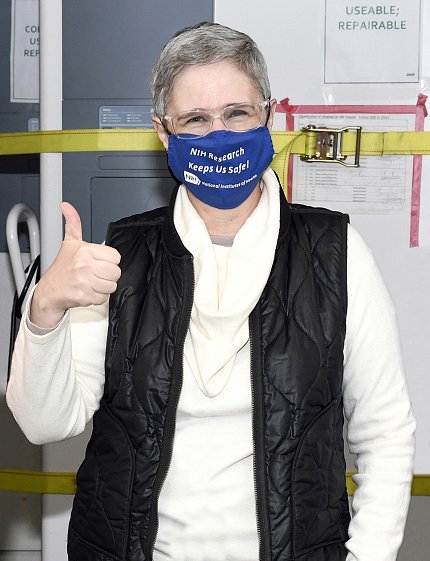NIEHS Donates Freezers for Covid-19 Vaccine Storage

Photo: Steve McCaw/NIEHS
On Mar. 16, NIEHS shipped 11 ultracold laboratory-grade freezers to the North Carolina department of health and human services (NC DHHS), thanks to a grassroots project from within the institute’s Office of Management.
The donation is the brainchild of three OM employees, who took it on as part of a leadership training program: Andrea Davis, management and program analyst; Kerri Hartung, sustainability coordinator; and Rick Weaver, inventory management specialist. The project took advantage of energy efficiency upgrades that were part of the institute’s continued sustainability efforts. As a result, more communities in the state are equipped to receive doses of the Moderna and Pfizer Covid-19 vaccines.
The team did not work alone. “It came to fruition thanks to many helping hands across the institute,” said Hartung.
“Many of our rural counties have been relying on dry ice storage because they do not have the required ultracold freezers,” noted NIEHS and National Toxicology Program director Dr. Rick Woychik. “This is a fantastic representation of NIEHS as a caring partner in the Covid-19 fight.”
According to Kim Jones, inventory management officer, donating federal property is not as simple as hauling it to the nearest willing recipient. She ultimately worked through the NC Federal Surplus Property program and NC DHHS, which picked up the freezers. From there, the state took over.

Photo: Steve McCaw/NIEHS
“To simplify the direct donation process and subsequent distribution, NC DHHS will act as a centralized hub, identifying counties in greatest need and transporting the donated surplus freezers to their end users,” Hartung explained.
NC DHHS will collaborate with other state agencies, such as NC Emergency Management and the Division of Public Health (DPH), to determine which localities will receive freezers.
“The donation of the freezers will lessen the burden of storing the vaccine in a thermal shipper container provided by Pfizer and of having to continue procuring and replenishing dry ice every couple of days,” said Dr. Amanda Williford of NC DHHS. She added that adequate and plentiful storage provides a true safety net for storing the Pfizer Covid-19 vaccine. “We [NC DPH] are grateful for this partnership with NIEHS.”
Regarding post-pandemic use of the freezers, Jones noted that they now belong to the state, which can decide how best to use them. Laboratory-grade freezers have potential uses from health care settings to community colleges and other educational and training programs. The NC Emergency Management office picked up the freezers from the NIEHS warehouse, which is itself an exemplary effort in sustainability, with LEED Platinum certification. “Another example of great teamwork and great leadership!” exclaimed Matthew Burr, head of the Administrative Services and Analysis Branch.
The freezer donation would not have been possible without the help of individuals across NIEHS and beyond: Brian Harris and John Sours of NIH ORF located at NIEHS, Paul Johnson and Steve Novak of NIEHS’s Health and Safety Branch, Jones of the Office of Management Administrative Services and Analysis Branch, Corey Morris of the Durham County public health department, Michael Spencer of NIEHS’s Division of Intramural Research and Williford of North Carolina’s DHHS.

Photo: Steve McCaw/NIEHS
